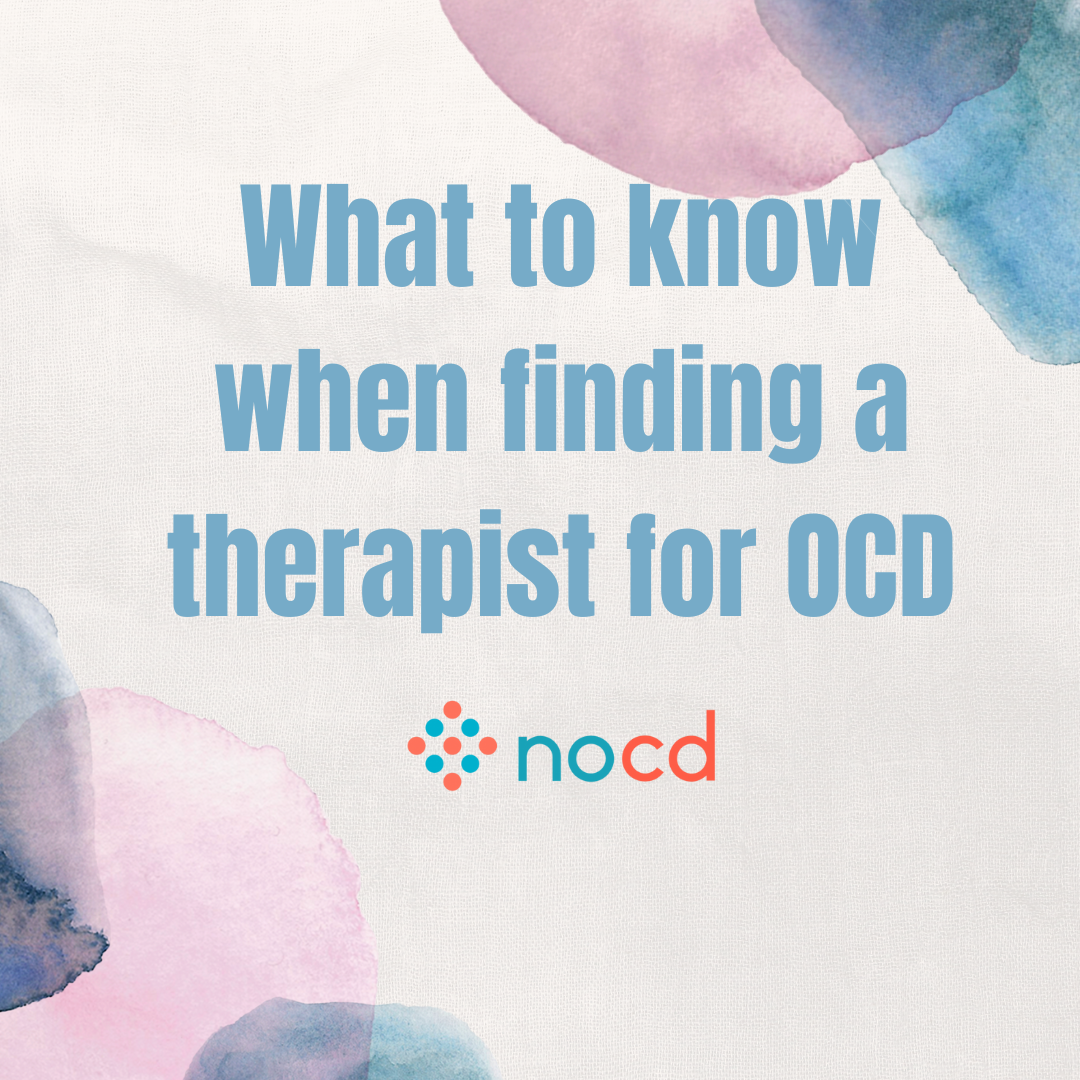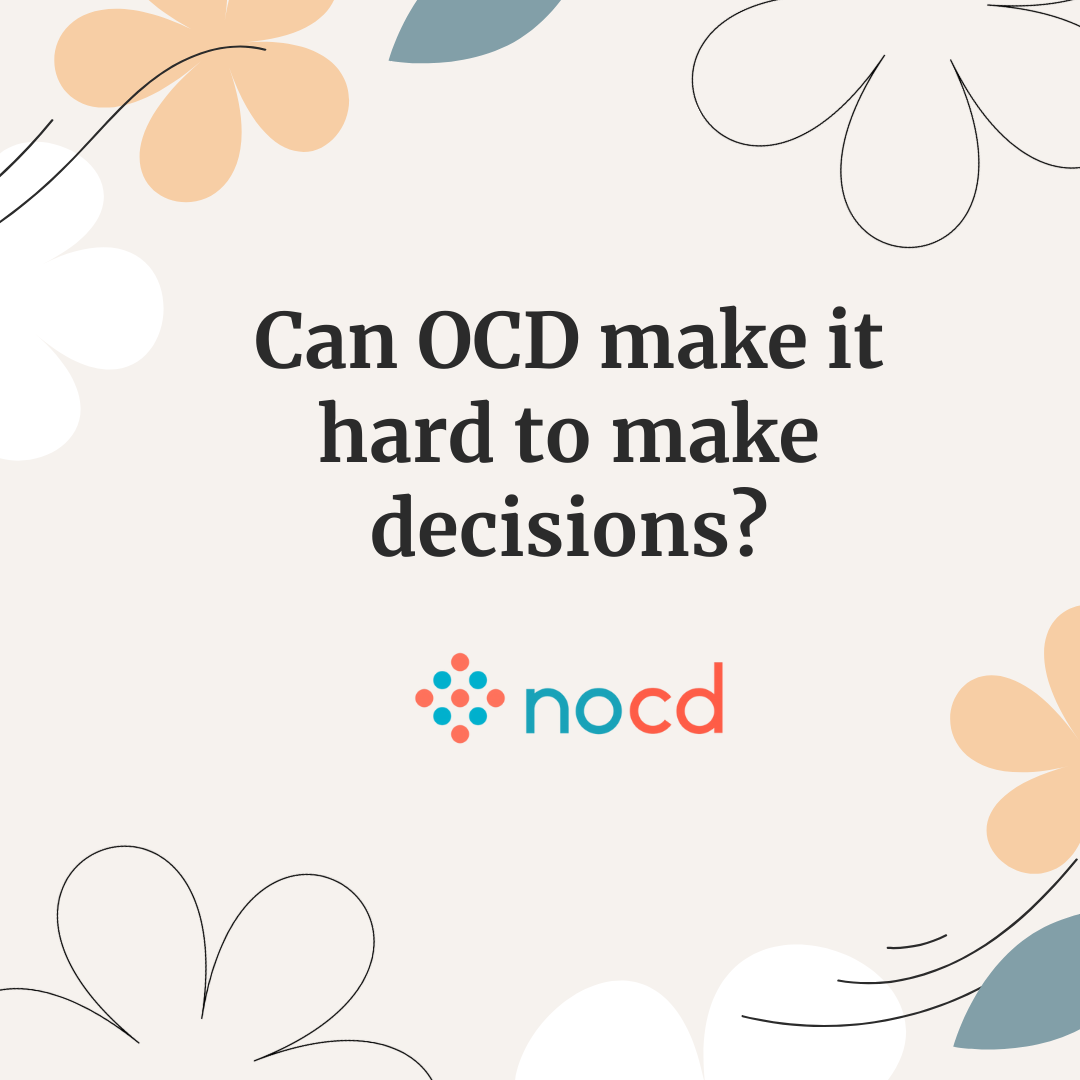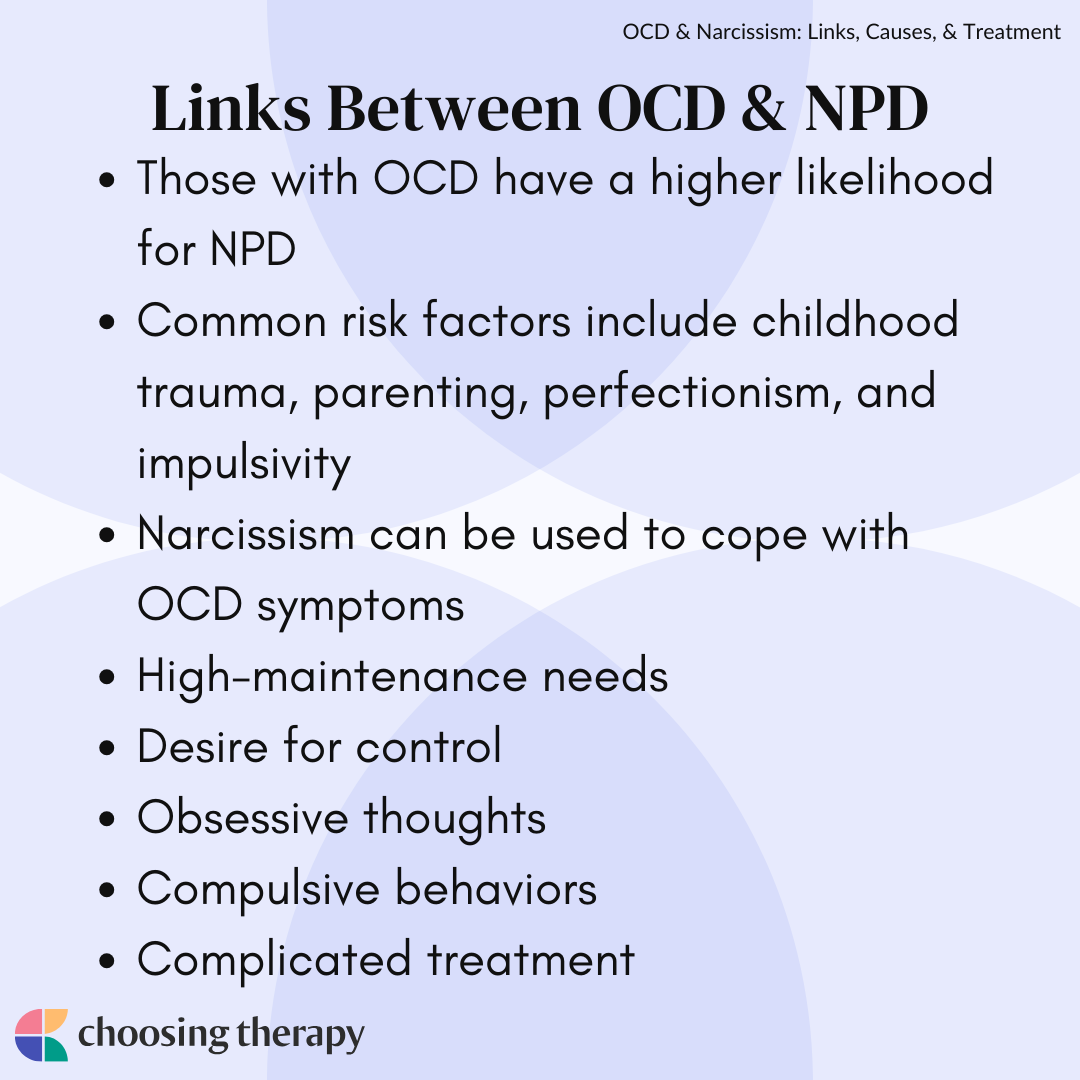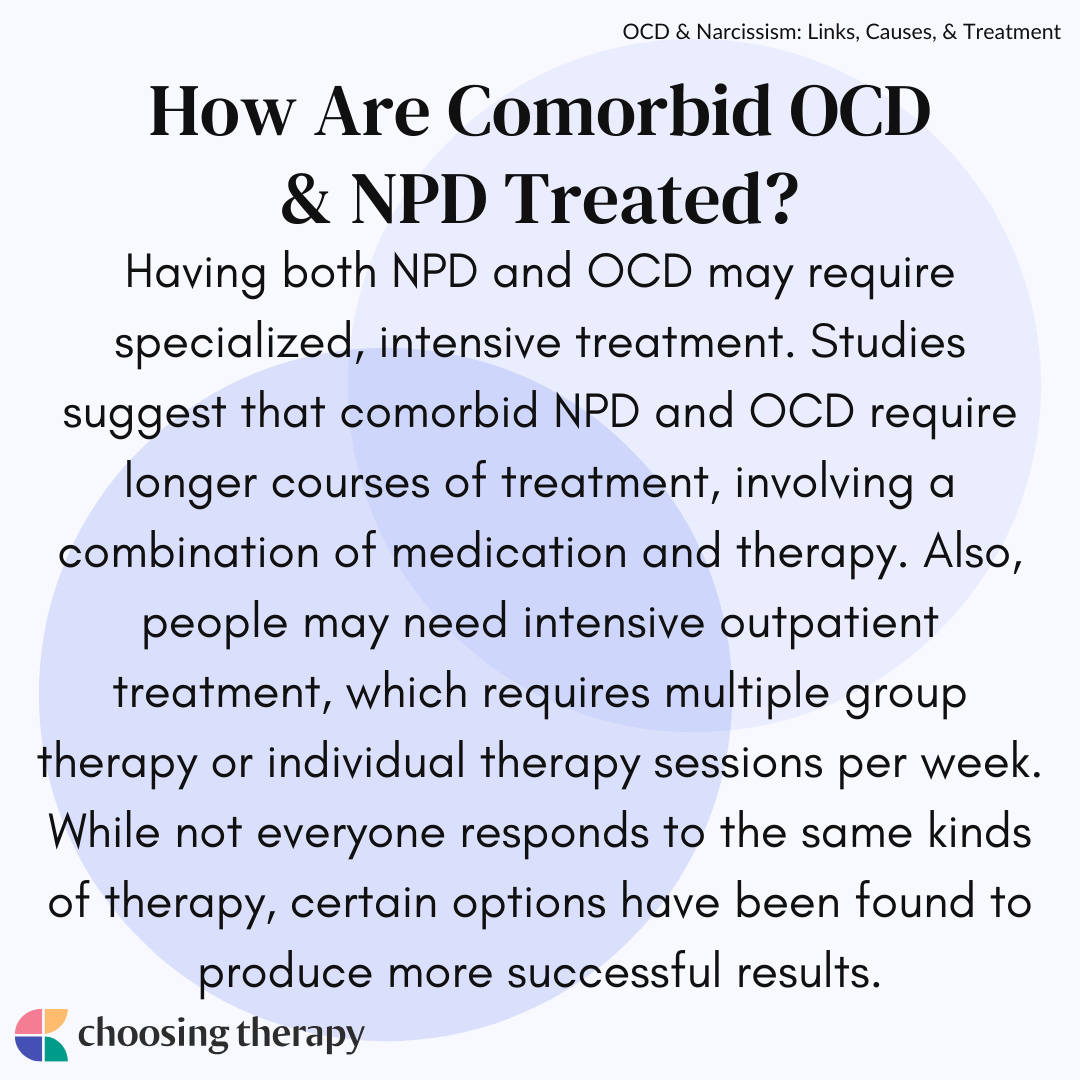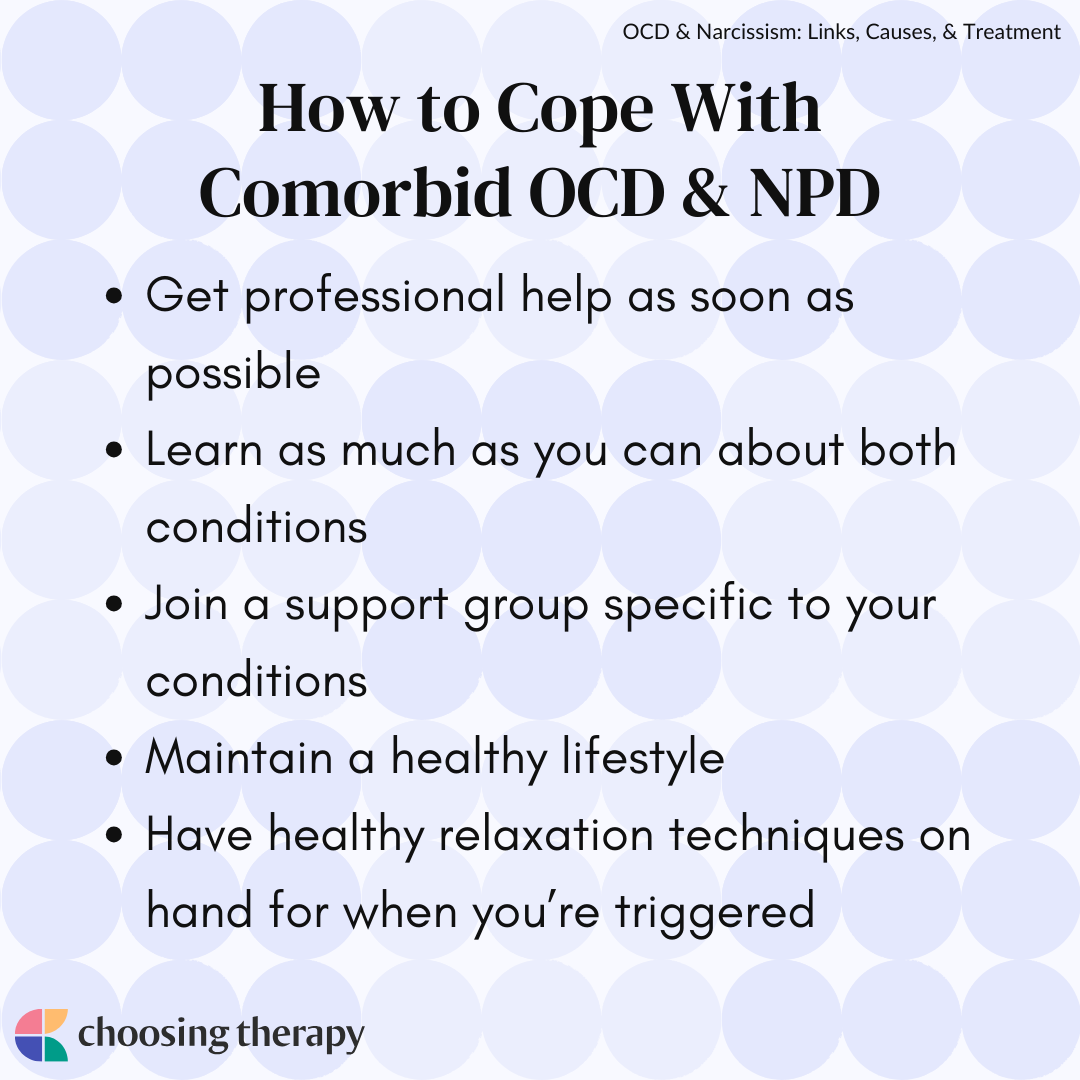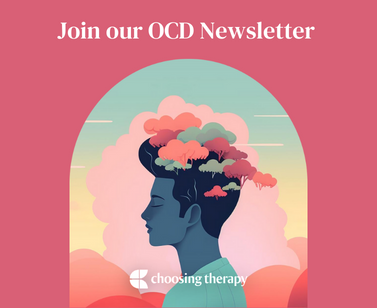Narcissistic personality disorder (NPD) and obsessive-compulsive disorder (OCD) share similar symptoms and risk factors, including high levels of perfectionism, a need for control, and rigid thought and behavior patterns.1,2,3 While it’s not uncommon for the conditions to be co-occurring, having both NPD and OCD leads to severe symptoms that require more intensive treatments, such as psychotherapy and psychiatric medication.4
How much do you know about OCD? Take This 11-Question OCD Quiz From NOCD. If you or a loved one are struggling with OCD, NOCD provides convenient, affordable, and effective OCD treatment covered by most major insurance plans.
What Is Obsessive Compulsive Disorder (OCD)?
Obsessive compulsive disorder (OCD) is a mental disorder characterized by unwanted obsessive thoughts and rigid, repetitive behaviors. People with OCD ruminate on thoughts that cause them a lot of stress and anxiety (OCD obsessions) and engage in ritualistic behaviors to get rid of the anxiety they cause (OCD compulsions).5
Here are some examples of common OCD obsessions and compulsions:
| OCD Obsessions | OCD Compulsions |
|---|---|
| Fears about germs or contaminated surfaces (Contamination OCD) | Disinfecting surfaces or washing hands repeatedly, not touching things |
| Concern about health, illness, or diseases (Health OCD) | Researching online, frequent doctor appointments, labs, and diagnostic tests |
| Obsessive thoughts and doubts about sexuality, or being gay or bisexual (HOCD) | Avoiding same-sex friends or family, researching sexuality, ‘checking’ for arousal |
The more severe OCD becomes, the more time, attention, and energy these obsessions and compulsions take up. Therefore, it becomes increasingly harder for someone to function, focus, and get things done.
Common signs and symptoms of OCD include:5
- Excessive overthinking and rumination on obsessive thoughts
- Repeating words, prayers, or mantras to try to calm down or refocus attention
- Rigid, structured routines and ways of completing tasks that are very time-consuming
- Excessive need to check and re-check to ensure something was done
- Intolerance for unplanned changes in routine or schedule
- Being highly detail-oriented or perfectionistic
What Is Narcissistic Personality Disorder (NPD)?
Narcissistic personality disorder (NPD) is one of ten personality disorders listed in the DSM 5. People with NPD tend to be arrogant, entitled, overly sensitive, and difficult to interact with. The narcissist’s big ego is usually a front for their fragile self-esteem, which makes them highly dependent on external validation, praise, and attention in order to feel okay about themselves. Those with more severe NPD lack empathy and remorse, often resorting to exploitative or even abusive behavior to get what they want.
Common narcissistic traits and symptoms of NPD include:5
- An excessive need for external validation, praise, and attention
- Extreme sensitivity to criticism or rejection
- An inflated sense of self-importance or delusions of grandeur
- An unwillingness to take responsibility for actions and behavior
- Self-centeredness and a sense of entitlement
- A tendency to project anger and blame other people
- Fantasies of wealth, power, or success
- Envy and high levels of competitiveness
- Impulsive or reckless decisions, getting bored easily
Treatment For OCD NOCD: Online OCD Treatment Covered By Insurance – Regain your life from OCD. Do live video sessions with a licensed therapist specialized in treating OCD. Treatment from NOCD is covered by most major insurance plans. Learn how you can use your insurance benefits. Visit NOCD Talkiatry: Is OCD Medication Right For You? Speak with A Doctor – Talkiatry can match you with a psychiatrist who takes your insurance and is accepting new patients. They’re in-network with major insurers and offer medication management with supportive therapy. Free Assessment
10 Links Between OCD & NPD
There are many links between OCD and narcissism, as they share many of the same risk factors. Furthermore, research suggests that having OCD increases the likelihood of developing NPD later in life.2,3 There are other interesting similarities and overlaps between symptoms of OCD and the traits and tendencies associated with narcissism.1,2 Finally, having both conditions is associated with more severe symptoms and a need for more intensive forms of treatment.4
Some of the known links between OCD and NPD include:
1. Those With OCD Have a Higher Likelihood for NPD
Researchers have found that people with OCD are much more likely to develop a personality disorder than those with other mental illnesses. One study found that 74% of participants with OCD had a co-occurring personality disorder, compared to only 55% of those with a different diagnosis.3 This research suggests that OCD frequently co-occurs with personality disorders, and may even be a risk factor for developing a personality disorder later in life.
2. Common Risk Factors Like Childhood Trauma, Parenting, Perfectionism, & Impulsivity
OCD and NPD share some of the same risk factors, including biological, social, and environmental factors. All of these elements may work to increase someone’s likelihood of developing a certain disorder.
Shared risk factors for NPD and OCD include:2,5,6,7,8
- Experiencing childhood trauma
- Ineffective parenting styles
- Being highly sensitive or reactive as a child
- Perfectionism and neuroticism
- High levels of impulsivity
3. Using Narcissism to Cope With OCD Symptoms
OCD is a highly debilitating mental illness that makes it very difficult to function in daily life.8 Some researchers believe that narcissistic traits and tendencies could be a coping strategy or defense mechanism that makes it easier to cope with symptoms of OCD.
Some examples of coping with OCD through narcissism include:9
- Superiority or arrogance might allow people with OCD to believe their way of doing things is the ‘right’ or ‘better’ way
- Self-centeredness may allow someone with OCD to focus solely on their wants, needs, and preferences
- Lower levels of empathy can reduce concerns about how a person’s OCD tendencies are affecting or impacting others
- Projecting blame outward can help people with OCD maintain the illusion that they’re fully in control of their lives and circumstances
4. High-Maintenance Needs
Another link between the symptoms of OCD and NPD is that people with these conditions often demand special treatment and accommodations from others. Those with NPD usually feel like they’re entitled to certain privileges that aren’t offered to others. Similarly, a person with OCD is high-maintenance and demanding, often expecting others to be willing to accommodate their rigid schedules, routines, and specific preferences.9
Examples of high-maintenance behaviors and demands in OCD and NPD include:
- Demanding an upgraded room at a hotel
- Ordering special items not on the menu at a restaurant
- Excessive requests made of an assistant at work
- Becoming outraged when something is not done ‘just right’
- Becoming fixated and angry when they feel slighted by someone
5. Desire for Control
Both OCD and NPD usually involve a strong desire to be in a position of authority, control, or power, but for slightly different reasons. For people with OCD, the need for complete control over their lives, circumstances, and environment is driven by high levels of anxiety and neuroticism. Conversely, those with NPD may be driven by a want for power, authority, or status.
6. Perfectionism
Perfectionism is common in people diagnosed with both conditions.2 A person with co-occurring NPD and OCD often displays rigid and perfectionistic tendencies in one or more areas of their lives. Often, perfectionistic tendencies are driven by a desire for success and a laser-like focus on achieving specific goals in life.2
7. External Conditions Required for Internal Stability
In both OCD and NPD, it’s common for a person to have certain external ‘conditions’ that need to be met in order to feel emotionally stable. For example, someone with OCD may feel anxious or upset if another person puts something in the wrong place. This same behavior might cause a narcissist to feel disrespected or even outraged. In both disorders, there is an emotional reliance on external circumstances that one relies on to feel calm or stable.
8. Obsessive Thoughts
It can be argued that both OCD and NPD can cause obsessions and compulsions. In OCD, obsessions are often focused on upsetting or scary thoughts, such as making a mistake or getting sick. Narcissistic obsessions may center around power, success, envy, or revenge that the narcissist fantasizes, rehearses, or ruminates on.
9. Compulsive Behaviors
Compulsions are often an attempt to feel more secure or in control. Compulsive behaviors are driven by strong impulses and urges, which are features of both obsessive-compulsive disorder and narcissistic personality disorder. In both conditions, people are often driven by these strong urges and impulses, which can become destructive and problematic for them.
Some examples of compulsive behaviors in NPD and OCD include:
- A need for praise and validation
- A need to get reassurance from others
- A need to compete with people or one-up them
- A need to find answers, research things, or be right
- A need to feel in control of a situation
10. Complicated Treatment
It’s not uncommon to be diagnosed with both OCD and NPD. In fact, one study found that among people with OCD, about 4.5% also had an NPD diagnosis, compared to just .9% of those with other kinds of mental illness.3 Having both NPD and OCD has been linked to exacerbated symptoms and impairment, thus complicating the treatment process. For instance, research shows that those with OCD and a co-occurring personality disorder require more intensive treatment than others with just OCD.4
What is the best therapy for OCD? Exposure And Response Prevention Therapy (ERP) – Do live video sessions with a therapist specialized in ERP, the gold standard treatment for OCD. Treatment from NOCD is covered by many insurance plans. Start With A Free 15 Minute Call
How Are Comorbid OCD & NPD Treated?
Having both NPD and OCD may require specialized, intensive treatment. Studies suggest that comorbid NPD and OCD require longer courses of treatment, involving a combination of medication and therapy. Also, people may need intensive outpatient treatment, which requires multiple group therapy or individual therapy sessions per week.4
While not everyone responds to the same kinds of therapy, certain options have been found to produce more successful results.4,8
Therapy options for comorbid NPD and OCD may include:
- Exposure and response prevention (ERP): One of the most effective treatments for OCD is ERP. It involves gradual exposure to triggers and impulse control training to teach people to avoid compulsive behaviors
- Cognitive behavioral therapy (CBT): CBT is another highly effective therapy that helps people change unhelpful patterns of thinking and behavior that contribute to their symptoms
- Acceptance and commitment therapy (ACT): Third-wave behavior therapies like ACT use mindfulness and acceptance strategies to help clients unhook from difficult thoughts, and process their emotions without giving into their impulses
How to Cope With Comorbid OCD & NPD
The most important step to take if you are struggling with comorbid OCD and NPD is to get professional help from a counselor, psychologist, or other licensed clinician. Finding the right therapist who is experienced in treating personality disorders, OCD, and co-occurring conditions is a good idea, especially since treatment may be more involved than treating a single condition.4 Additionally, there may also be some lifestyle changes and healthy coping skills that can help you cope with your symptoms.
Here are some tips for coping with comorbid NPD and OCD:
Get Professional Help as Soon as Possible
If you are struggling to manage your symptoms and your quality of life seems to be declining, seek professional help immediately. Keep in mind that, as with any health concerns, if left untreated your condition could worsen. That’s why early intervention is key. Therapy can also offer a safe and validating space to talk and work through the OCD- and NPD-related issues. With your psychotherapist’s aid, a treatment plan can be devised that’s suitable for you and help to treat both conditions.
Learn as Much as You Can About Both Conditions
A good place to start your healing journey is to learn as much as you can about both NPD and OCD. This can help you get an overview about what to expect from each condition. Moreover, the knowledge you’ll gain will assist you to better understand yourself, your symptoms, and how these can affect your day-to-day life and relationships. Also, because there can be much overlap between NPD and OCD, you’ll learn to distinguish one condition from the other as well as points where they both intersect.
Join a Support Group Specific to Your Conditions
Whether online or in-person, joining a support group specific to your condition can help you better manage your symptoms and related stressors. Support groups can offer an opportunity to meet others who have the same issues as you, understand what you’re going through, give you feedback, and more. You’ll also gain a sense of belonging and opportunities to learn and grow as a person. In turn, you’ll become more resilient and improve your overall wellbeing.
Maintain a Healthy Lifestyle
Although it can be difficult, maintaining a healthy lifestyle can be beneficial to your overall health and help prevent OCD or NPD or symptoms from worsening. You can establish healthy habits by eating nourishing foods, engaging in regular physical activity, getting proper sleep, and prioritizing your psychological wellness. When you lead a healthy lifestyle you’ll feel physically better, mentally balanced, and more equipped to deal with life challenges.
Have Healthy Relaxation Techniques on Hand for When You’re Triggered
It’s incredibly important to find healthy ways to manage and cope with your stress. Engaging in relaxation techniques like meditation, breath work, tai chi, and yoga can help mitigate the impact stress can have on your overall well-being. Relaxation strategies enable you to activate your body’s natural relaxation response and bring your body and mind back into balance. Staying consistent with any of these practices can come in handy in moments of stress or anxiety.
In My Experience
To help our readers take the next step in their mental health journey, Choosing Therapy has partnered with leaders in mental health and wellness. Choosing Therapy is compensated for marketing by the companies included below. OCD Therapy NOCD: Effective, Affordable, & Convenient OCD Therapy Do live, face-to-face video sessions with a therapist who specializes in treating OCD and get 24/7 support between sessions. NOCD is covered by many insurance plans and is available nationwide. Visit NOCD Treatment From An Online Psychiatrist Talkiatry OCD is treatable. Talkiatry specializes in OCD and provides personalized care with medication and additional support. Get started with a short assessment. OCD Newsletter A free newsletter from Choosing Therapy for those impacted by OCD. Get helpful tips and the latest information. Sign-UpAdditional Resources
What to know when finding a therapist for OCD With so much information out there regarding providers and treatment options for obsessive compulsive disorder, it can be hard to know exactly where to start—especially when you have to consider everything from the type of provider to the different treatment methods, as well as how you’ll fit it into your busy schedule. Can OCD make it hard to make decisions? From choosing what to wear in the morning to picking what to eat for dinner, decision-making is a part of everyone’s daily routine. But for millions of people with Obsessive-Compulsive Disorder (OCD), making any choice can feel like a daunting, sometimes impossible task.